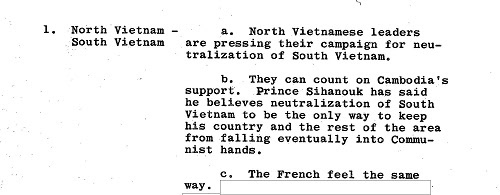Those of us old enough to remember the Senate Watergate hearings will always recollect the mantra of Senator Howard Baker of Tennessee: “What did the president know and when did he know it?” Under a new policy adopted by the Central Intelligence Agency, that question will be easier for historians to answer.
On September 16, the CIA released online 2,500 Presidential Daily Briefs (PDBs) from the Kennedy and Johnson administrations. The PDBs summarize vital day-to-day intelligence and national security issues for the president. These top-secret updates were restricted to the president, vice president, and a small group of officials selected by the president.
The documents were released under the auspices of the CIA’s Historical Review Program, which identifies, reviews, and declassifies documents on historically significant events. The documents are available as PDFs at www.foia.cia.gov. They include the CIA’s typewritten analyses of global hot spots, as well as maps and other intelligence. Although heavily redacted, they hold clues to help historians of the presidency, international relations, the military, postcolonialism, the Cold War, and many other fields, encompassing all regions of the globe.
The PDBs were released at an event at the Lyndon B. Johnson Presidential Library, attended by both CIA director John Brennan and director of national intelligence James Clapper. Brennan took the opportunity to trumpet the CIA’s newfound commitment to transparency. “The PDB is among the most sensitive and classified documents in all of our government,” Brennan said. “The release of these documents affirms that the world’s greatest democracy doesn’t keep secrets merely for secrecy’s sake.”1

A redacted portion of the President’s Daily Brief from November 24, 1963. Newly declassified by the CIA, this was the first PDB Lyndon B. Johnson viewed as president. FOIA.cia.gov/collection/PDBs.
There was a great deal of irony in Brennan’s statement, since the CIA had fought tooth and nail for years to keep the PDBs from the public. In 2004, the National Security Archive (an NCH member) and Larry Berman, then a professor of political science at the University of California, Davis, filed suit in federal court after the CIA refused Berman’s Freedom of Information Act request for two PDBs from the Johnson administration. The CIA claimed it had a “blanket policy” of not releasing PDBs.2
In 2007, the Ninth Circuit Court of Appeals ruled that the release of the Johnson-era PDBs could “reveal protected intelligence sources and methods.” The court, however, rejected the CIA’s assertion of a total exemption from FOIA requests regarding the release of PDBs.3
“The declassification and release of years of top-secret PDBs from the Kennedy and Johnson era represent a treasure trove for historians,” said Mark K. Updegrove, director of the LBJ Presidential Library.4 Brennan added that the agency is planning the release of thousands of PDBs from the Nixon and Ford administrations next year and will continue to review, declassify, and release PDBs after a 40-year time limit has passed.5
Notes
- Josh Gerstein, “CIA Relents in Fight on Presidential Intelligence Briefings,” Politico.com, September 15, 2015. [↩]
- “Professor Sues CIA for President’s Daily Briefs,” National Security Archive, December 23, 2004. [↩]
- “Court Permits CIA to Withhold Historic President’s Daily Briefs, but Denies Categorical Exemption for PDBs,” National Security Archive, September 5, 2007. [↩]
- “CIA Releases Previously Classified Presidential Briefings at LBJ Presidential Library,” LBJ Presidential Library press release, September 8, 2015. [↩]
- Gerstein, “CIA Relents,” Politico.com. [↩]
This work is licensed under a Creative Commons Attribution-NonCommercial-NoDerivatives 4.0 International License. Attribution must provide author name, article title, Perspectives on History, date of publication, and a link to this page. This license applies only to the article, not to text or images used here by permission.

